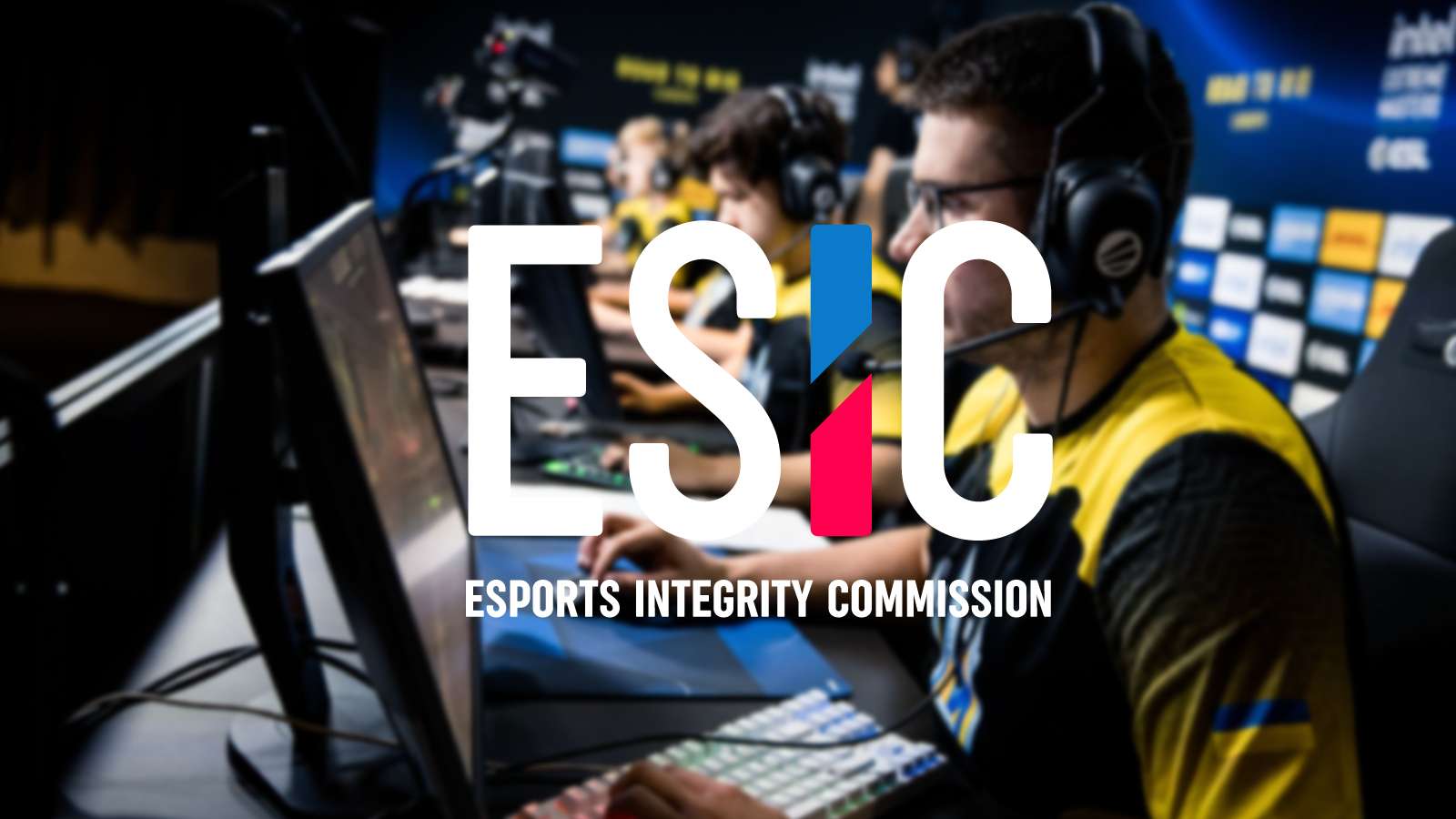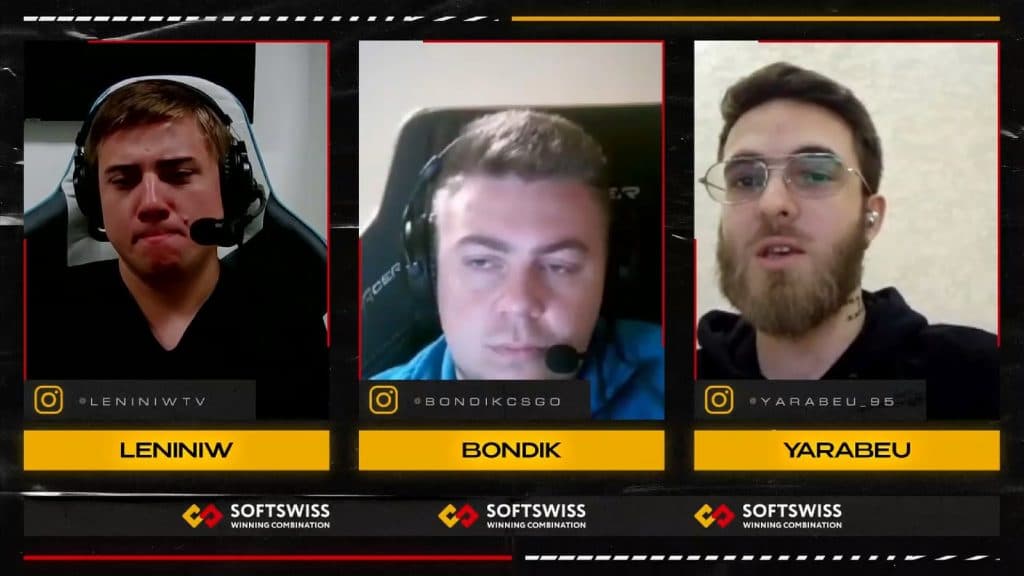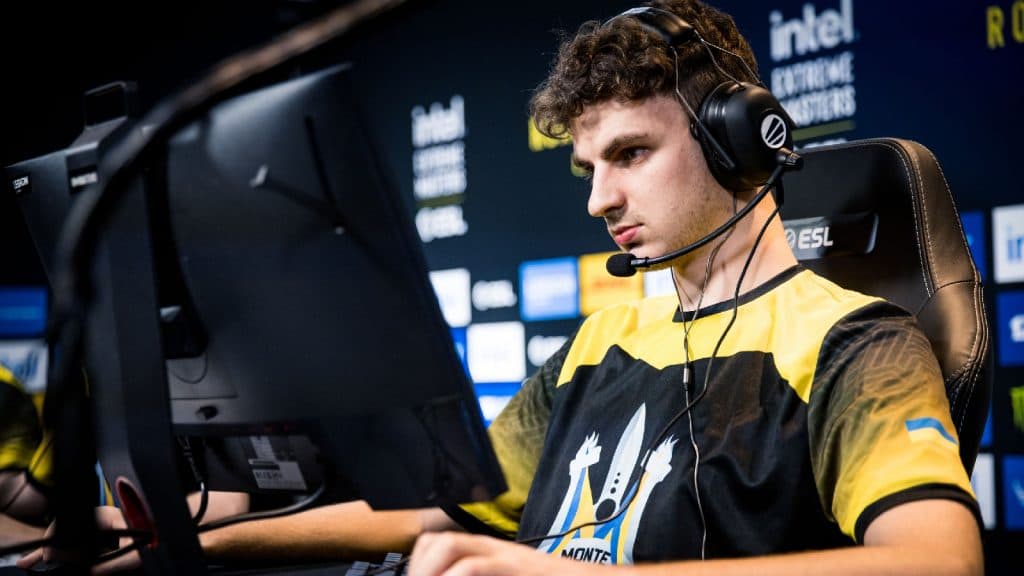Scrutinizing the ESIC “whistleblower”: From savior to blackmailer
 Helena Kristiansson/ESL Gaming via ESPAT & ESIC
Helena Kristiansson/ESL Gaming via ESPAT & ESICIn the final chapter of the article series about the wild story of Aleksey ‘Yarabeu’ Kurlov, Dexerto’s Editor-at-Large, Richard Lewis, speaks with a team that was allegedly blackmailed by the self-proclaimed whistleblower.
You can read Part 1 of this article series, ‘The first contact’, here. Part 2, ‘Going down the rabbit hole’, can be found here. Part 3, ‘It’s a wonderful life’, can be found here. Part 4, More wild claims and ESIC’s response, can be found here.
It’s 2023 and we should probably accept that any notion of integrity, competitive or otherwise, in CS:GO is an oil-pipe dream. We start the year with a calendar predominantly funded by a combination of oil money, war criminals, and despotic regimes, with a side helping of functional Ponzi schemes. Tournament operators ignore their own rules to benefit their partners, multi-gaming organizations ignore their own values to benefit their bank accounts, and developers spend more time worrying about penalizing those that would bruise their egos than those that would cause harm to their subordinates.
For a brief period, we had a group in the form of ESIC that was at least trying to introduce the alien concept of accountability into an industry where lying and stealing are rewarded, and where failing upwards is all but guaranteed if you are fluent in American corporate bullshit. Their reputation is now mostly in tatters through a combination of constant attacks on their legitimacy and their own incompetence. The general consensus now among the rubes that make up the bulk of the esports audience is that it’d be better if they didn’t exist at all.
All of this is why I spent so long conversing with and writing about someone I’d have no qualms about labeling a lunatic. A man so briefly employed by ESIC that to call him a former employee is only correct in a technical sense, Aleksey ‘Yarabeu’ Kurlov spent the weeks after his acrimonious split shouting suspicions, half-truths, and full-out delusions into any microphone placed in front of him. And even though he accused me of being embroiled in one of the many conspiracies he spoke of, I couldn’t help but want to write about him anyway.
 Twitch.tv/leniniw
Twitch.tv/leniniwThe story was one I could completely empathize with. A former match-fixer who wanted to join the “good guys” and catch the people doing the exact thing he claimed to have gotten away with for years only to then be driven insane by the knowledge that the evidentiary standard required to actually punish people was so high it was almost unreachable… Well, how could you not appreciate that? His breakdown was textbook Lovecraft. He had gazed long into the abyss, seen the formless and nameless atrocities within, and then realized in his final moments he was powerless to do anything except shriek and jibber at people who thought him mad.
As a story, it was the kind I thought had value with many lessons to be learned from it. There’s the insight it gives us into ESIC’s hiring policies begging the question of how someone like this could end up in the center of a hotbed of sensitive information. There’s the broader discussion about what we can do about match-fixers when the developments in technology over the last few years mean you can only be caught using the tools law enforcement has access to (unless you’re a moron). There’s the glaring issue of players looking for a path to professional play being unable to monetize their efforts amid pressures to attend school or get a job. There’s the stark reality of how damaging false claims can be. There’s the grim reality that more professional players than you would ever care to know have fixed matches at some point in their careers. But hey, forget about all this… Tune in for my crowdsourced interview with a popular player where I ask them WHAT THEIR FAVOURITE COLOUR IS.
Of course, in the end, even the story itself was disappointingly predictable, that Yarabeu wasn’t just the esports Francis Thurston but rather someone more self-interested. The most valuable commodity in the match-fixing scene is knowledge, and not just for obvious reasons. What you might not know is there’s a whole cottage industry of people who line their pockets not through betting on the assured outcomes but by other means. Selling information to tournament organizers about who is fixing their games is useful for both the diligent and nefarious alike. Some will react by excluding the guilty teams, other unscrupulous tournament operators will look to bring them into the fold and give a more profitable structure to their activities.
If a player has ever been caught openly admitting to fixing in a recording or a chat log then, yes, blackmail is also a viable way to make money. The bigger the player the bigger the potential payday, and there is no statute of limitations on these alleged crimes. Indeed, when you think about it, it was just a variation of these methods that enabled Yarabeu to even get his opportunity with ESIC in the first place, his fabled “database” now exposed as little more than a collection of screenshots, shared gossip and innuendos.
One of the many people accused of match-fixing by Yarabeu was Volodymyr “Woro2k” Veletnyuk. He denied it like every other name on the list, stating on Telegram, “Let them throw at least one proof [sic] so that they catch me on fraud. Why doesn’t he provide proofs [sic] if he knows everything about me? Let him call me the tags that are banned and the rest.”
 Helena Kristiansson/ESL Gaming via ESPAT
Helena Kristiansson/ESL Gaming via ESPATWoro2k is in many ways the perfect target for such an allegation if it were to be false. A player with, putting it mildly, a chequered history in an already short career, he finds himself without many advocates in the professional scene. Strange clips of his gameplay were shared among players on the FPL circuit with some arriving at the conclusion that he had to be cheating and alleged leaked VK screenshots claimed to show him admitting that he had played on VAC-banned accounts in the past. Worth noting though that no credible entity — and crucially, Valve — confirmed this or acted on it, despite the high-profile nature of the allegations. In the end, in his own words, the allegations, combined with a perception about his attitude, saw him removed from the most accomplished team he had played for to date, MAD LIONS.
He now plies his trade for Ukrainian organization Monte, whose team managed to finish runners-up in the most recent ESEA Advanced League, guaranteeing themselves a spot in the more prestigious ESL European Challenger League, starting later this month. A little after I published my second piece about “The ESIC Whistleblower”, Woro2k sent me a message. He asked about my interactions with Yarabeu, which as you’ll now know were mostly ridiculous, and what I had made of him. I was candid and then asked why he wanted to know. He told me that the management of Monte had been approached by Yarabeu, or as he called him, “the ESIC guy”, and that he had said he had proof of some of their players fixing matches.
“We offered to help him investigate,” Woro2k said, “but since he didn’t want to do anything for free, we said that if we have evidence to ban our player we could pay, but the evidence he gave is not enough, in general, to do something to the player…We didn’t pay him and now he says we will not get any invites [to tournaments]. Would you like to help open this situation publicly and show who this person is?”
So, let’s lay the table. I absolutely cannot vouch for anyone’s innocence here. Everything from the top tier of Counter-Strike down is a joke in terms of competitive integrity, and it’s almost certain that out of the dozens of names Yarabeu threw out on the internet, a handful will certainly be guilty. That said, the presumption of innocence has to be the guiding principle, and there’s plenty to indicate why Monte would be the ideal target to threaten. An upcoming organization qualifying for a competition where they will compete alongside teams within the top 20 in the world is an opportunity for sponsorships and invites that cannot be squandered. Having unpopular players on the roster means the public is more inclined to believe that they could be guilty of anything at all. In layman’s terms, “That’s a really nice organization you have there… Be a shame if something were to happen to it.”
Somewhat typically, despite having made allegations against Woro2k directly, Yarabeu was unable to produce evidence to back those claims and instead focused on other players on the Monte roster, namely young Swedish player Joel ‘joel’ Holmlund. Yarabeu had also apparently intimated that he also had evidence about Hristiyan ‘REDSTAR’ Pironkov, yet none of this was produced.
“After his podcast, I wrote to him asking about myself,” Woro2k explained. “He didn’t give proof of anything about me, but after I asked [about other players on the team], he provided some evidence about Joel but it was only screenshots from some chat of someone selling info or something like that. I said to him if he gave solid evidence we would pay 5-10k… After that, he [Yarabeu] started talking about money every time, and now some tournaments don’t want to invite us after saying they would do it. He wrote to me and our CEO saying we would never get invited because the CEO had not paid him $5k and he said he lost [a source of] information because he gave [these] screens to us where some guy was talking about Joel match-fixing for money.”
Having seen the “evidence” Yarabeu was using as leverage in this financial transaction, I have to say it is utterly laughable, the type of second-hand sourced gossip not even the most shameless anonymous leaker would post for clout. It was literally a screenshot of a conversation of someone saying the player in question threw a game for a “friend’s friend” for $500. There wasn’t any conversation with joel directly, no evidence of financial transactions… Hell, the person complaining about it didn’t even provide details of which game it was specifically or even if it was while he was on the Monte roster. Yet such is the nervousness around these claims being taken seriously behind the scenes that it was enough for Yarabeu to get a direct conversation with the Monte management to discuss a payment arrangement.
I have to be honest: I’m not even sure what they would have been paying for. Public silence? Perhaps that’s a part of it, but that could never be guaranteed. It’s a screenshot, not an original document with a coded self-destruct sequence. Instead, Yarabeu was arguing that the organization would need the evidence of match-fixing in order to protect themselves from litigation should they decide to terminate a player’s contract early. In a private conversation with the management, he argued that the money he was requesting was cheaper than the cost of the three months’ mandatory severance he believed was required, and as such, it was a cost-cutting measure. In his own words, taken from WhatsApp messages that we reviewed, he said the following:
“I have something more [meaning more information] I can only tell your CEO. When should I give you the Bitcoin wallet? Ask what’s happening with the promised payment?”
After being told by the manager that he wasn’t sure what the CEO would want to pay, Yarabeu continued.
“What’s your salary? [meaning player salary] 5k, give or take? 2 kicks saving 2k a month. Kicking without reason he’d have to pay 3 months’ salary by European standards of contracts, so 30k. You told me about 5k so savings are apparent.”
After having reviewed these exchanges, I contacted the organization’s CEO, Dmyro Vovk, and asked him about what exactly had happened in regard to their interactions with Yarabeu. He told me the following:
“Yarabeu gave us some screenshots that include some messages about Joel. After that, he started to demand money from us because he had lost contact with the person that gave him the information about fixed matches and helped him to earn money. He pretends to struggle with match-fixing, but at the same time makes money from it. He is literally just a scammer. He threatened us about new tournaments, talking about doing everything to make organizations stop inviting us. Overall, he is a nasty person.”
Based on the inconclusive nature of the evidence that he had provided, they refused to pay Yarabeu any money. He didn’t take this with grace and threatened to hurt their ability to compete at future tournaments.
“His last message to Woro was: ‘You can close our conversation. You will never get any invites. Say thank you to your CEO'”, Vovk said. “As he positions himself as an ex-ESIC employee I don’t know what he could say or who he could talk to. But I hope that he is just a liar.”
I asked if he would characterize what happened as an attempt at blackmail, to which he simply replied, “Sure.”
Even on the basis of such flimsy and tainted evidence, the organization had moved to protect itself and preserve its integrity. joel was moved to the inactive roster the same day that Yarabeu spoke with the team management, October 19, 2022. Towards the end of November, REDSTAR joined him there. In the absence of hard evidence, one has to feel sorry for them as it isn’t clear if they did anything wrong or are even being investigated by ESIC, who, putting it generously, are operating under a significant backlog.
What this activity does do, is raise questions about the similar allegations that Yarabeu made about Team Spirit starlet Igor ‘w0nderful’ Zhdanov. The methodology seems alarmingly similar – publicly accuse a big name of match-fixing, claim to have evidence, refuse to share that evidence with anyone capable of vetting it, and demand to only speak with the organization directly. It’s not clear whether or not he did indeed pressure Team Spirit to make a financial “contribution”, but the similarities between these two interactions, as well as the overlap in their timing, cannot be ignored. It was on November 1 that Team Spirit publicly announced they were cooperating with ESIC in an investigation about w0nderful. Nothing has been said about it since.
The reality at this stage is that it is all fruit of a very poisonous tree. Yarabeu’s allegations have gone from being intriguing, if dubious, to now being a clear mechanism through which he hopes to practice self-enrichment. Despite his claims of wanting to punish match-fixers, he has attempted to do deals where revelations of wrongdoing would go mostly undisclosed to the public. He’s eroded the credibility of ESIC when it was already coming under valid scrutiny and impugned the reputation of multiple professional players on the basis of his famous hunches and what appeared to me in some cases to be flat-out delusions.
The good news at least is now he should be seen as a contemptible and ridiculous figure, even by the low, low standards of esports. I doubt he has the kind of clout needed to get a serious tournament operator to pull an invite for a team that deserves inclusion. But if he does, hopefully, this at least underlines why he shouldn’t be listened to. Extraordinary claims require extraordinary evidence, and everything I’ve seen Yarabeu produce is the type of cheap talk you can find on any Discord where bitter fans and wannabe pretenders congregate. Far from cleaning up the scene, he became yet another indistinguishable stain on its blemished reputation.